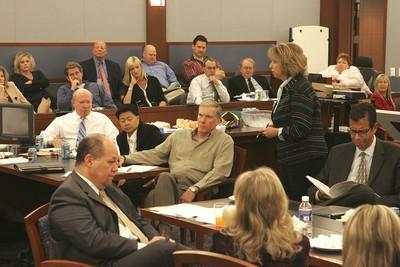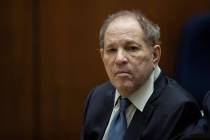Judges hold off on changes

Clark County judges agreed Wednesday to postpone making changes to the county’s indigent defense system until a statewide commission appointed by the Nevada Supreme Court examines the issue.
Supreme Court Justice Michael Cherry, who is heading a commission to examine issues raised in a Review-Journal series about the county’s contract defender system, said the problems are serious enough to merit further review.
"I recognize how difficult it is to change things in the criminal justice system," Cherry said at a meeting of District Court judges on Wednesday. "I know this is a serious problem . . . I would hope you’d give the statewide commission a chance to look into these issues."
Cherry said last week that the Supreme Court commission, comprising court officials from Clark and Washoe counties, would attempt to bring all indigent defense systems in the state in compliance with American Bar Association standards by the end of the year. However, a local committee of Clark County judges had already devised a plan to reform the county system more quickly.
The newspaper series, "Conflicted Justice," last month exposed serious flaws in the contract system, also known as the conflict system, in which judges select private attorneys to represent indigent defendants who cannot be represented by a full-time public defender because of some conflict of interest.
The newspaper study, covering one year’s contract cases, disclosed that some contract defenders gave little time and attention to many of the cases they were assigned. Other appointed attorneys vastly overbilled the county for work on cases that qualified them for an hourly fee from the county.
The investigation also found that contract defenders, who receive a monthly stipend of $3,000, were much more likely to negotiate guilty pleas on cases that did not pay hourly.
A five-judge committee formed in response to the Review-Journal investigation of the contract defender system concluded in a 10-page report that reforms are needed to "eliminate or diminish (its) apparent inherent weaknesses" in a system that is now more than two decades old.
Among other changes, the committee recommended that judges no longer should hire contract lawyers who appear in their own courts.
Critics of the system say the present system can encourage attorneys to focus on pleasing judges who control contracts, to the possible detriment of clients.
The Clark County judges proposed creating a committee of court officers to select attorneys qualified for contract work and hourly appointments, and assigning contract defenders at random to a group of district judges and justices of the peace.
District Judge Sally Loehrer, a member of the committee of county judges, urged fellow judges at Wednesday’s meeting to approve and immediately implement the panel’s recommendations.
The judges were prepared to vote on the matter when Cherry chimed in with his request.
Before a standing-room-only crowd of about 50 court officials at Wednesday’s meeting, Cherry, a former contract defender and District Court judge, said his Supreme Court commission could help enhance the recommendations.
The Supreme Court commission is expected to have a preliminary report by July 1, Cherry said. That’s the same date the contracts of conflict attorneys are annually renewed.
Loehrer said "watershed changes" to the system may be unnecessarily delayed, but Cherry suggested the county judges could enact at least some reforms after the state commission’s first meeting on May 15.
Both Cherry and the committee of Clark County judges have endorsed an eventual phasing out of the conflict system, through a possible expansion of the county special public defender’s office, which currently handles only murder cases and cases dealing with the termination of parental rights.
Some justices of the peace have complained they had too little say in proposed changes to the contract system. Justices of the peace are judges of the lower county courts, and supervise contract defenders handling misdemeanor cases and early-stage felony cases.
Loehrer dismissed what she called "the bitching and moaning" of the justices of the peace, none of whom attended Wednesday’s meeting.
Loehrer said, "The chief (judge) of Justice Court was on the committee, and he didn’t come to the last meeting . . . We can only invite them to a meeting. We can’t force them to attend."
Justice of the Peace Douglas Smith, who is listed in the committee’s first report as a co-chair, said last week that he felt he had "no power" in helping shape the recommendations.
The committee’s membership has since been increased to include another justice of the peace.
District Judge Stewart Bell, who headed the local committee, could not attend Wednesday’s meeting because of a family emergency.
Cherry said he would try to include all interested parties in his commission’s meetings. He appointed Gary Peck, executive director of the American Civil Liberties Union of Nevada, to the panel on Wednesday.
Peck said he hoped to help fix a system he sees as "badly broken."
Conflicted JusticeON THE WEB: Video of the judges meeting: reviewjournal.com/ media/video/ contractsystem.html


















